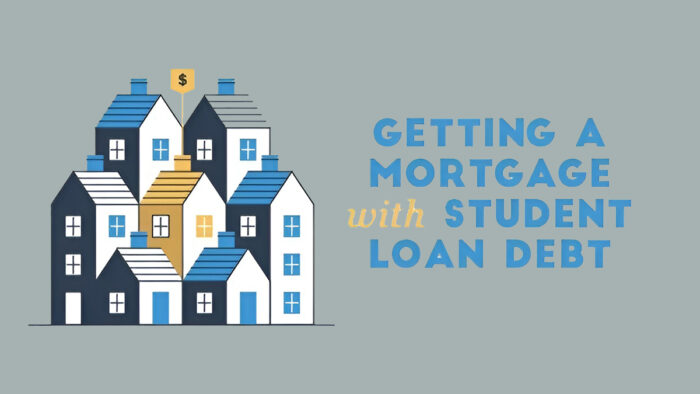Generally, student loan debt can have a huge impact on your finances and can also affect your ability to purchase a house.

Typically, it is possible to buy a house with a home loan while you still have student loan debt, provided you meet the eligibility requirements of the lender.
Having student loan debt can affect your ability to buy a house. This is because most lenders will review your financial situation to determine your eligibility to repay the loan.
Student Loan Debts Can Affect Your Eligibility for a Home Loan
Although it is possible to get a new loan while carrying student loan debt from some lenders, qualifying for a home loan is tedious. This is a result of many reasons, one of which is the effect of your student loan on your DTI ratio.
Basically, student loan debt automatically increases your debt-to-income ratio. Once your lender evaluates your DTI ratio and confirms it is on the high side, it would be considered a huge risk and, as such, may be unwilling to offer you a home loan.
In addition, student loan debt can also impact your credit score negatively. For instance, if you default on your payment schedule, your credit score is most likely going to be reduced. In most cases, it takes a lot of time to rebuild your credit score if you default on your loan payments.
Tips on How to Buy a House with Student Loan Debt
We know it can be overwhelming trying to manage your previous loan while still seek ways to buy a new house. Here’s the good news: you can still purchase a house while still carrying student loan debts. Highlighted below are some ways through which you can manage your student loan debt and still buy a house:
- Refinance Your Student Loan: Refinancing your student loan is a great way to save interest and still qualify for a mortgage. If you took out a private student loan when the interest rate was on the high side, then you should consider refinancing to a lower rate. You could also potentially decrease your DTI ratio by refinancing your loan.
- Apply for Down Payment Grants: There are local and national down payment assistance programs that borrowers can explore. These programs offer down payment grants to individuals who are buying a new home for the first time. However, borrowers need to meet the credit score requirement in order to be eligible for a down payment grant.
- Decrease your debt-to-income ratio: Since your DTI ratio is one of the factors most lenders consider before approving a loan, if your DTI ratio is on the high side, make efforts to reduce it. You can decrease your DTI ratio by making timely payments or switching to a longer repayment plan.
How to Get the Best Home Loan with Student Loan Debt
Perhaps you are perturbed about qualifying for a home loan while still carrying a student loan debt; worry less!
If you have a huge student loan, some lenders may still be willing to offer you a home loan, as long as you fulfill their eligibility criteria.
The easiest way to get the best home loan is by shopping around for various loan options. You can get a home loan from banks, credit unions, and online lenders.
Filter out the ones you are not eligible for and focus on the few ones that you qualify for. From the ones you qualify for, compare the loan term and interest rates to determine the one that best suits your financial needs.
FAQs
Should I pay off my student loan debt before buying a house?
Yes, if you are financially capable of paying off your student loan before purchasing a new house, you can. But it is possible to still buy a house during the process of paying off your student loan debt.
One of the perks of paying off your student loan before buying a home is that it increases your chances of qualifying for a home loan. You can even explore different lenders to get the best rate out of them all.
Does student loan debt affect credit scores?
Most definitely! Your student loan debt has an adverse effect on your credit score in so many ways. For instance, if you have huge debt on your student loan, it would result in your credit score declining.
If you default or miss a payment, your credit score will also take a hit.
To improve your credit score, you should strive to meet up with the payment of your loan. By making timely payments, most lenders consider you eligible and responsible when it comes to managing credit.



